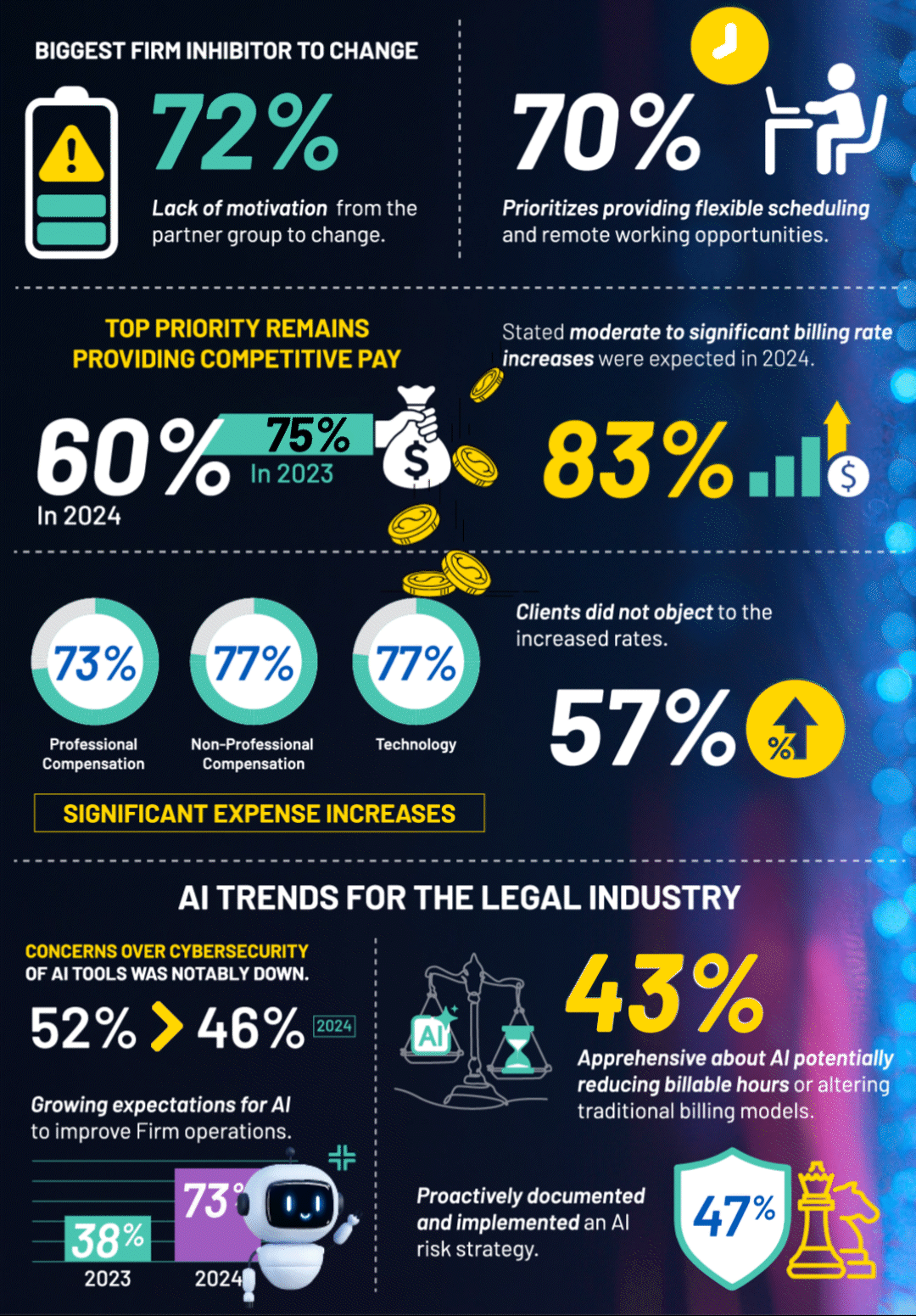A snapshot of significant findings at play so far this year, with guided insights from Withum’s 2024 Law Firm Leadership Survey.
How has your firm been responding to the changing legal landscape in the first half of 2025? Take a look at current trends and benchmark your firm’s practice management strategy so far this year to identify areas of improvement.
Firm Leadership Remains Resistant To Change
Despite the ever-changing landscape of the legal ecosystem, and the growing complexity of the law firm business structure, most firms still have antiquated management patterns that have been in place for decades. Prior generations relied on close knit communities of familiar colleagues and traditional single tier partnership structures. As such, it is no surprise that 72% & 50% of respondents, in 2024 and 2023 respectively, stated that the biggest Firm inhibitor to change continues to be the lack of motivation from the partner group to change.
Complacency caused by firm’s continued financial success continues to also be a main inhibitor to change (45% & 44% of respondents in 2024 & 2023).
0%
of Law Firms lack motivation to change
0%
are complacent due to the Firm’s continued financial success
Top Priorities for Law Firm Strategic Growth
Legal Talent
The market for legal talent has become more competitive, with lateral partner moves and mergers reaching record levels, even during a period of tremendous economic uncertainty. This has forced many firms to pursue both offensive and defensive strategies to both expand & protect key clients and service lines.
Lateral Hiring
Our respondents indicated that hiring individual lateral partners & lateral associates each decreased from 66% & 60% in 2023 to 55% & 52% in 2024, respectively, which reinforces the changing marketplace for qualified talent. Additionally, 57% of 2024 respondents indicated that a top priority for continued growth remained hiring top talent, wherever available.
Retention of Staff
Firms have also implemented strategies to retain valued staff. Providing competitive pay remains a top priority for 60% & 75% of respondents in 2024 & 2023, respectively. 53% & 40% of respondents prioritized providing professional development opportunities in 2024 & 2023, and 70% & 60% of respondents prioritized providing flexible scheduling and remote working opportunities in 2024 & 2023.

0%
of Law Firms prioritize providing flexible scheduling and remote opportunities

0%
responded that providing competitive pay remains a top priority
Billing Rates Continue to Rise
In a continued departure from historical patterns, law firm billing rates in 2024 rose at their fastest pace since the global financial crisis of 2020, averaging 6.5% growth despite weakening inflation. At the same time, pushback from clients appears minimal, with realization rates holding relatively steady and demand increasing in almost all relevant practice areas. Such results are consistent with data provided from our respondents, as 83% & 87% stated moderate to significant billing rate increases were expected in 2024 & 2023, respectively. Additionally, 57% of clients in 2024 had not objected to the increased rates in 2024 & over 43% of clients were paying on time through the end of 2024. Lastly, 30% of respondents expect to increase billing rates by 2-3% in the next twelve months, while 53% expect to increase rates by 4% or more.
Contact Us
For more information, please contact a member of Withum’s Law Firms Services Team.
Expenses Continue to Outpace Historic Patterns
From 2012 to the beginning of the pandemic in 2020, law firms averaged an expense growth of around 3% for both direct and overhead expenses. Instead of returning to those levels, today’s law firm expenditures continue to grow at an average expense growth of 5% over the twelve-month period ending in November 2024. Respondents noted significant expense increases to:
- Professional compensation (73% & 82% in 2024 & 2023)
- Nonprofessional compensation (77% & 71% in 2024 & 2023)
- Technology (77% in 2024)
The Rise of Generative AI and Emerging Technologies
As law firms strategize on how to navigate economic changes, it’s essential to recognize that they’re also operating in a rapidly evolving technological environment, one in which the theoretical challenges of the past are becoming very real practical challenges today. Survey respondents planned uses for generative AI include the following:
- Improving quality of client deliverables (52% & 33% in 2024 & 2023)
- Reduce overhead and labor costs (52% & 32% in 2024 & 2023)
- Document management and billing (52% & 18% in 2024 & 2023)
- Legal research and analysis (66% & 30% in 2024 & 2023)
- Efficiency in repetitive manual tasks (66% & 40% in 2024 & 2023)
0%
proactively documented and implemented an AI risk strategy
0%
were apprehensive about AI potentially reducing billable hours
73% of respondents in 2024 expect AI to improve Firm operations, up from 38% in 2023.
Trusting AI and its security remains at the top of the list of reluctance for firms. The most pressing concern regarding AI remains algorithmic bias and discrimination stemming from flawed data, cited by 57% of respondents in 2024, though this marks a slight decrease from 63% in 2023. Concern over cybersecurity in 2024 was notably down at 46% from 52% the previous year. Additionally, 43% of legal professionals in 2024 were apprehensive about AI potentially reducing billable hours or altering traditional billing models, a notable rise from 35% in 2023.
In response to these concerns, nearly half (47%) of the surveyed firms in 2024 have proactively documented and implemented a risk management strategy to define acceptable uses of AI and emerging technologies. However, 23% are still in the planning stages, and 20% have no current plans to develop such a strategy. When it comes to client communication, only 23% of firms have discussed the potential benefits of AI-driven efficiencies with their clients. Meanwhile, 30% intend to initiate such conversations, but a significant 37% neither have communicated nor plan to communicate these benefits, indicating a gap in client engagement regarding AI advancements.
Next Steps for Law Firm Leaders
Despite many law firms’ reluctance to embrace change, the legal industry is rapidly evolving with advancements in AI technologies, billing and expense challenges and shifting talent acquisition and retention needs. Firms must adapt by addressing these inhibitors and leveraging the strategic growth priorities that their competitors are embracing. Adopting emerging technologies and implementing proactive risk management strategies will be crucial for navigating this evolution and positioning firms for success.
If your firm has experienced these challenges so far this year and seeks to better align with industry trends, schedule a complimentary consultation with Withum’s Law Firm Services Team to address your concerns and target areas of improvement.
Author: John Cahill | [email protected]
Contact Us
Fill out the form to connect with a member of our Law Firm Services Team. We will respond as soon as possible, but no later than 1-2 business days.




